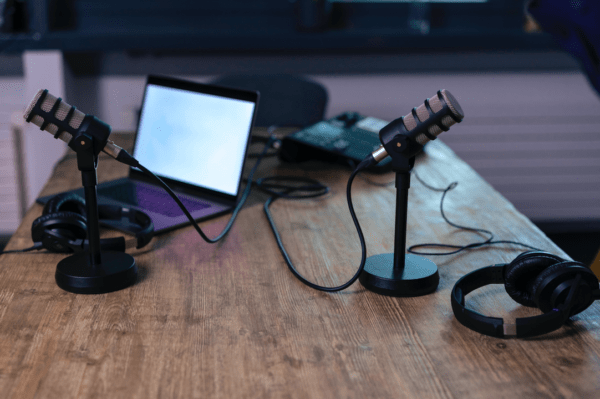
Creating a podcast is an excellent way to share your expertise and ideas and make your voice heard. A podcast can be a way to enhance your career or make an enjoyable hobby (and you never know where this can lead).
Here are some questions and tips to get you started on a podcast that will engage your audience and keep them coming back for more.
Who is your ideal audience?
We got the idea for our club’s podcast from Toastmasters International in America. They have produced over 250 episodes, amplifying the interviews and stories featured in the Toastmasters magazine, digging a little deeper, to put a voice to the written word. Their podcast is aimed squarely at existing club members. Our podcast is also for our members, and we also use it to attract new visitors by giving them a flavour of what to expect if they attend a meeting at Shilling Speakers Toastmasters Club.
Ask yourself why you are doing the podcast, if the purpose is to entertain, inform or educate and then jot down who you are trying to reach.
Once you have the answers to these questions, it will help you plan the content of your episodes, ensuring they are relevant and engaging. For instance, if your podcast is aimed at women in business, you’ll want to focus on topics that resonate with them and their challenges and interests. Choose a unique, memorable name for your podcast which hints at the content while standing out to potential listeners.
Decide on the episode length and structure
Having a consistent structure for your podcast episodes can greatly enhance the listening experience. Decide if you want to present alone or with a team and agree on the segments for each episode. This structure not only brings variety, but also sets clear expectations for the audience. Consistency helps your listeners know what to expect and creates a sense of familiarity, making your podcast appear more organised and professional.
The ideal length of a podcast episode can vary, but between 30-40 minutes is generally the most effective, because its long enough to delve into topics without overwhelming the listener. As you gain more experience, you can adjust the length based on audience feedback and the complexity of the topics covered. Shorter episodes can be punchy and more easily digestible, leaving listeners wanting more and eagerly anticipating the next episode.
How frequently will you publish?
Decide how often you’ll release new episodes and stick to that schedule. Publishing regular episodes not only meets audience expectations, but also helps maintain listener engagement. Consistency is the key in podcasting and also signals professionalism and reliability, which can help you grow a base of fans.
Use quality recording equipment
Audio quality is very important consideration. Invest in a high-quality microphone to ensure clear, professional sound. Consider the recording environment and minimise background noise and echoes to enhance sound quality. Poor audio quality can deter listeners, no matter how compelling your content
Choosing your editing software
Editing can make or break your podcast. Free software like Audacity and GarageBand are excellent starting points. If your budget allows, consider professional options like Adobe Audition or Hindenburg Journalist. Editing involves more than cutting out mistakes, it’s about creating a smooth, engaging flow. A well-edited episode can significantly improve the listener’s experience, making it polished and professional. During editing, pay attention to pacing, remove unnecessary pauses, and ensure transitions between segments are seamless.
Where to publish?
There is a lot of choice but make sure you publish your podcast on major platforms such as Spotify and Apple Podcasts. Pay attention to the title and description of each episode. A catchy, intriguing title can attract new listeners, while a detailed description with relevant keywords can help your podcast appear in search results. Consider creating custom artwork for each episode to make it visually appealing and professional.
Promoting your podcast
Effective promotion is crucial to growing your audience. Use social media platforms and tailor your approach to your target demographic. Younger audiences may prefer Instagram and TikTok, while professionals may be more accessible on LinkedIn. Don’t forget to share your podcast with friends, family, and colleagues. Creating a dedicated podcast website and considering paid advertising or email marketing can also enhance visibility. Another good strategy is to record a promotional video of up to one minute. Engaging with your audience by sharing behind-the-scenes content, episode highlights, and encouraging listeners to leave reviews will also lead to organic growth and a loyal listener base.
Podcasting is a dynamic and fulfilling way to share your voice with the world. By understanding your audience, maintaining a consistent structure and schedule, investing in quality equipment, and effectively promoting your content, you can create a podcast that resonates with listeners you will build a dedicated following.
ABOUT THE AUTHOR:

Violeta Saladiene is a member of Toastmasters International, a not-for-profit organisation that has provided communication and leadership skills since 1924 through a worldwide network of clubs. There are more than 400 clubs and 10,000 members in the UK and Ireland. Members follow a structured educational programme to gain skills and confidence in public and impromptu speaking, chairing meetings and time management. To find your nearest club, visit www.toastmasters.org
